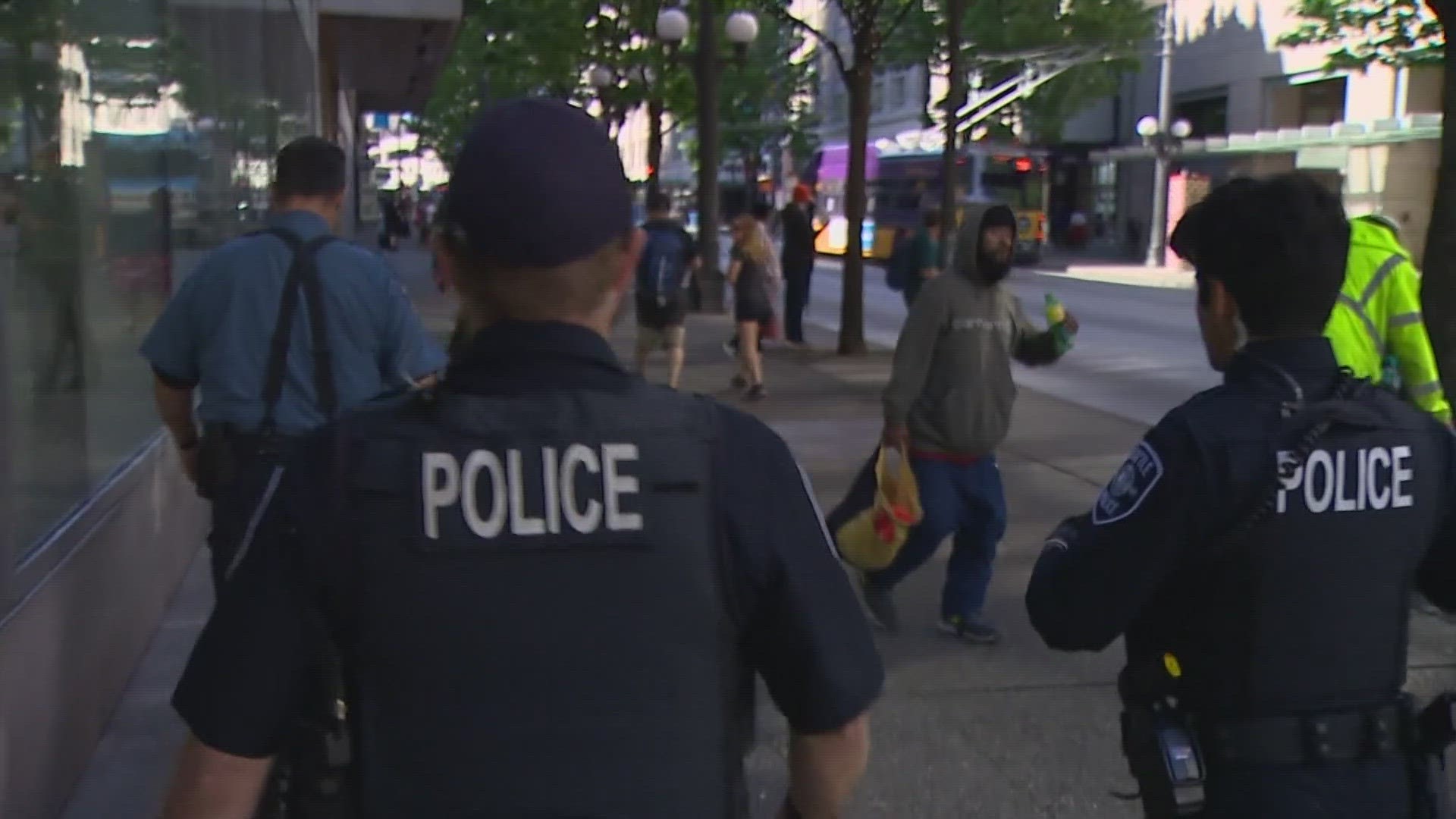SEATTLE — The Seattle City Council voted Tuesday to approve an ordinance that would make the use or possession of controlled substances a gross misdemeanor within the city.
The legislation was approved 6-3. Councilmembers Teresa Mosqueda, Kshama Sawant and Tammy Morales voted against the legislation.
The Washington State Legislature passed a bill making public drug use a gross misdemeanor earlier this year. However, because the City of Seattle didn’t have its own public drug use law on the books, public drug use cases could not be tried by the Seattle City Attorney.
The city council attempted to pass a public drug use law in June, but it failed by one vote. Councilmembers Lisa Herbold and Andrew Lewis changed their initial votes.
“I hope that we see a measurable increase in the number of people who are getting well, who are taking advantage of services and who are getting off the street," Lewis said. "And I hope that we see accountability for people who are declining those services, who continue to disrupt public services on our streets by not taking advantage of them.”
This ordinance emphasizes that the city’s preferred approach to addressing public drug use is diversion – whether it’s offering diversion options instead of making an arrest, offering diversion options after an arrest has been made, or offering diversion options in place of filing charges.
“We know a police-only response to addiction will not work," Councilmember Lisa Herbold said. "This legislation acknowledges that and, for the first time in Seattle, explicitly states that diversion and treatment should be the foundation of our response to drug use.”
The legislation outlines that a substantial part of its plan includes referring people for treatment through the Let Everyone Advance with Dignity (LEAD) program. LEAD is a pre-booking diversion model that subcontracts with multiple service providers for case management and outreach, according to the program's website. The ordinance states that the program is able to "sufficiently support diversion" for those who are "eligible and appropriate for that intervention" as long as the LEAD program is provided with sufficient resources and the city is prioritizing referrals from police at the point of arrest for pre-booking diversion.
“I'm relieved, I'm tired, and I'm happy to be moving forward. This has been an incredibly contentious process. And hopefully, we can just start helping people now that we've got this on the books,” Councilmember Sara Nelson said.
Seattle Mayor Bruce Harrell announced $27 million in investments to combat the opioid crisis at the end of July. Seven million will be earmarked toward capital investments with $20 million going toward a long-term, multi-year strategy and plan to increase treatment and overdose response services. At a Public Safety and Human Services Committee meeting last week where the proposal was approved by a 4-1 vote to go before the full council, Councilmember Teresa Mosqueda expressed concern that without a concrete plan outlined for the funding that is promised to come with the bill, there were no assurances that the city could stand up the diversion resources much of the ordinance relies on. Mosqueda was the sole "no" vote on the proposal.
“Given my background in public health and my steadfast commitment to addressing root causes of behavioral health and substance use disorder, as well as my duty as Budget Chair, I cannot in good conscience vote for this bill as it doubles down on harmful, ineffective, and costly incarceration to address a public health crisis - with no assurances that there will be significant new funding to provide treatment on demand and diversion strategies instead of jail," Councilmember Mosqueda said after the final vote.
The guidance included in the ordinance states that arrests should only occur when there is a “threat to the peace and wellbeing of the community or a threat of harm to others.” Nothing in the ordinance "shall mandate an arrest to occur," according to the text.
Seattle City Attorney Ann Davison said she is pleased the council passed this legislation.
"I was part of the initial effort last spring to bring this to Council, and it has admittedly been frustrating to see the several months of delay between then and now. It has also been heartbreaking to see the tragedy of lives lost due to drug overdose during that time.
The most important thing is that now all available tools can be used to address our public safety challenges, and intervention is available to get people who need it into treatment.
Now that this legislation has passed, I look forward to working with public safety partners and treatment providers on its implementation.”
The Downtown Seattle Association called the vote a "critical, albeit overdue step forward."
"The city must take action to increase treatment and enforcement and approach this public health emergency with the same urgency and collaboration demonstrated during the Covid pandemic," the statement read.
SPD policy - which would be finalized after the ordinance passes - will "identify factors to guide officers when assessing the threat of harm presented by an individual." The assessment is only meant to guide an officer's decision-making and cannot be used as an element in a criminal defense.
The ordinance also specifies that a lack of available diversion options does not constitute a reason for an arrest.
The ordinance will go into effect 30 days after it is signed by Mayor Harrell.
"After analyzing final adjustments to the bill and amendments from throughout the process, my office will issue an Executive Order in the next week to provide training and guidance to the police department on implementation, as well as metrics to track progress,” Harrell said.

